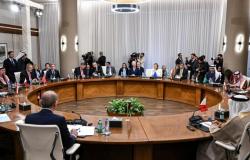In the final, chaotic hours before rebel forces stormed Damascus and ended Bashar al-Assad‘s iron-fisted rule, the Syrian president had already fled the country. His departure, shrouded in secrecy, marked the abrupt collapse of his 24-year regime and his family’s 50-year hold over Syria. As the clock ticked towards Sunday morning, Assad had already abandoned his seat of power, leaving behind a disoriented government. His aides were kept in the dark about his plans, with some learning of his departure only after the fact.
Secret departure
The final days of Assad’s rule were marked by confusion and secrecy. Rebel forces had launched an offensive in the north of Syria on November 27, and by the end of the month, the regime had lost control of Aleppo. As the rebels moved south, capturing Hama and Homs, Assad remained in Moscow, where his wife was receiving cancer treatment. During this time, he falsely assured his aides that Russian support would come, misleading them into thinking that military assistance would halt the rebels’ advance.
Syria’s Jolani Sends First Direct Message To Putin; ‘Rebels Did Not Attack You Because…’
The following Saturday, on the eve of Damascus’s fall, preparations for a speech were made in the presidential palace, news agency AFP reported. Assad’s media adviser was tasked with drafting a speech for a political meeting that was expected to take place the next morning. But by evening, the situation had taken an unexpected turn. Assad, who had requested the speech, stopped answering calls, and his media director, Kamel Sakr, also went silent. By 2am on Sunday, as rebel forces neared the capital, Assad’s government apparatus began to disintegrate. Security forces and top officials abandoned their posts, with soldiers fleeing the capital, leaving Damascus eerily empty. The government had lost control.
As panic set in, a palace official recounts the chaos of the final hours: “We didn’t even know if the president was still at the palace. It was unimaginable that he had already left,” a palace official told AFP.
‘Kept escape plans hidden from family’
As the collapse of his regime became imminent, Assad kept his plans to flee Syria a secret from almost everyone around him. He deceived aides, officials, and even his own family as the situation in Damascus deteriorated. Sources with direct knowledge of the events told Reuters that Assad did not confide in anyone about his intentions. His final hours in Syria were marked by a series of false assurances to his military commanders and a calculated departure that left many in the dark.
On the eve of his escape, Assad told a gathering of military and security officials at the ministry of defence that Russian support was on the way, urging them to hold their positions.
“He told his commanders and associates after his Moscow trip that military support was coming,” the head of Syria’s main opposition abroad, Hadi al-Bahra, told Reuters. “He was lying to them. The message he received from Moscow was negative.”
Hours later, as the capital teetered on the brink of collapse, Assad left for Moscow without informing anyone of his departure. His own presidential office manager, expecting him to return home after work, was left bewildered when Assad instead headed to the airport.
The escape was calculated and shrouded in secrecy. Assad’s brother Maher, the commander of Syria’s elite 4th Armoured Division, was left out of the plan and later fled to Iraq before heading to Russia. Meanwhile, Assad’s maternal cousins, Ehab and Eyad Makhlouf, attempted to flee but were ambushed by rebels—Ehab was reportedly killed and Eyad wounded.
Rebel takeover
Assad’s sudden departure, alongside the collapse of his military forces, paved the way for the insurgents’ swift entry into Damascus. By Sunday morning, the rebels had taken control of the capital, marking the end of Assad’s decades-long dictatorship. Despite the speed of their victory, the insurgents were conscious of the need to reassure a population scarred by years of war. As crowds gathered in the streets, some insurgent fighters sought to calm fears of extremist rule. Hayat Tahrir al-Sham, the group leading the charge, has promised to create an inclusive government, but concerns over their past ties to extremist groups lingered among many Syrians.
Meanwhile, international powers quickly scrambled to shape Syria’s transition. US Secretary of State Antony Blinken held talks with regional allies, urging the formation of a non-sectarian interim government.



